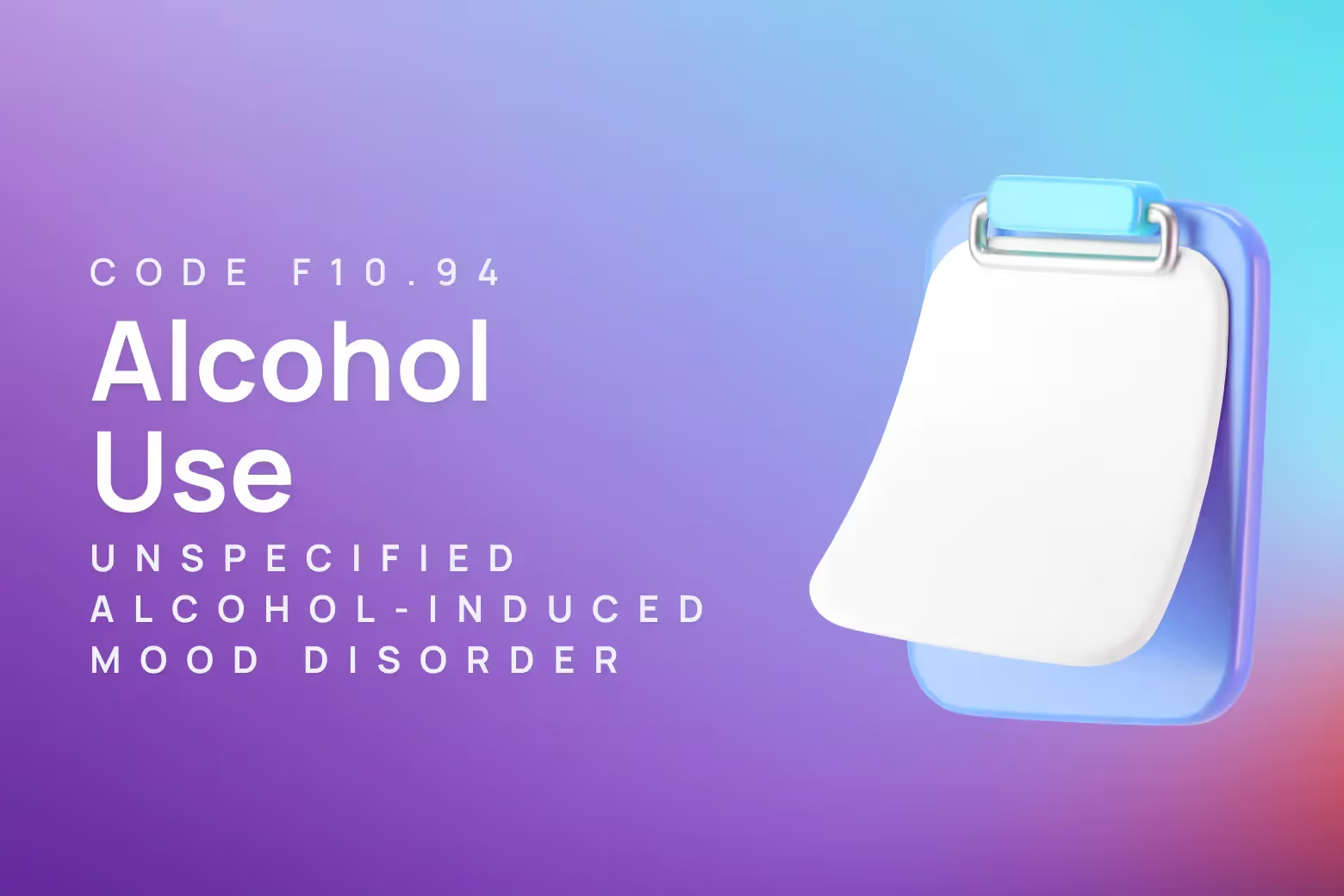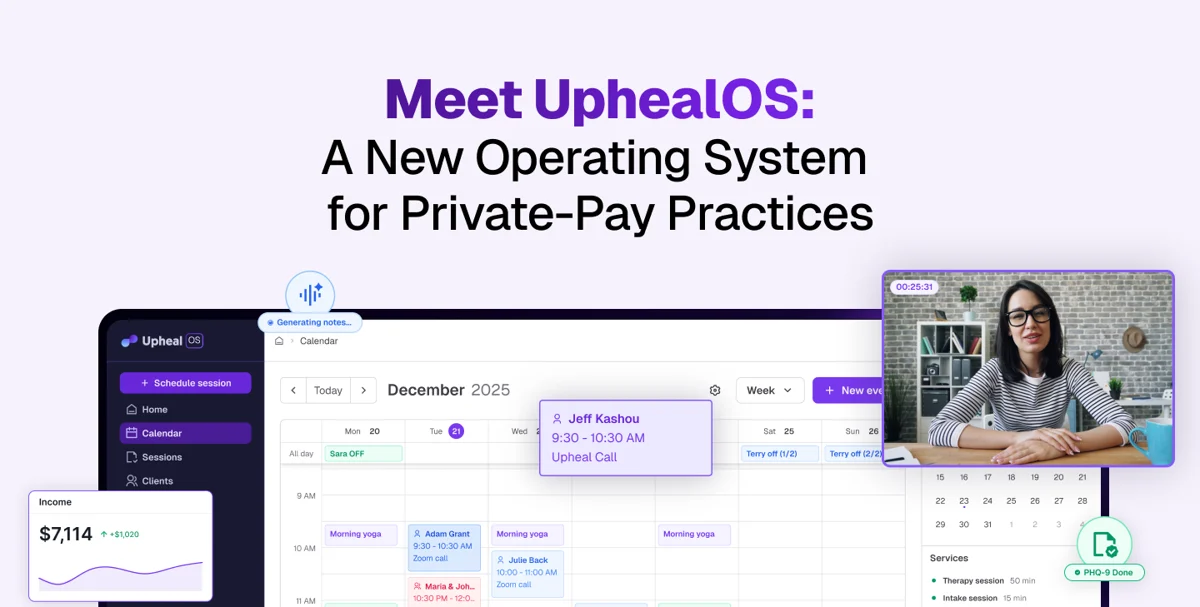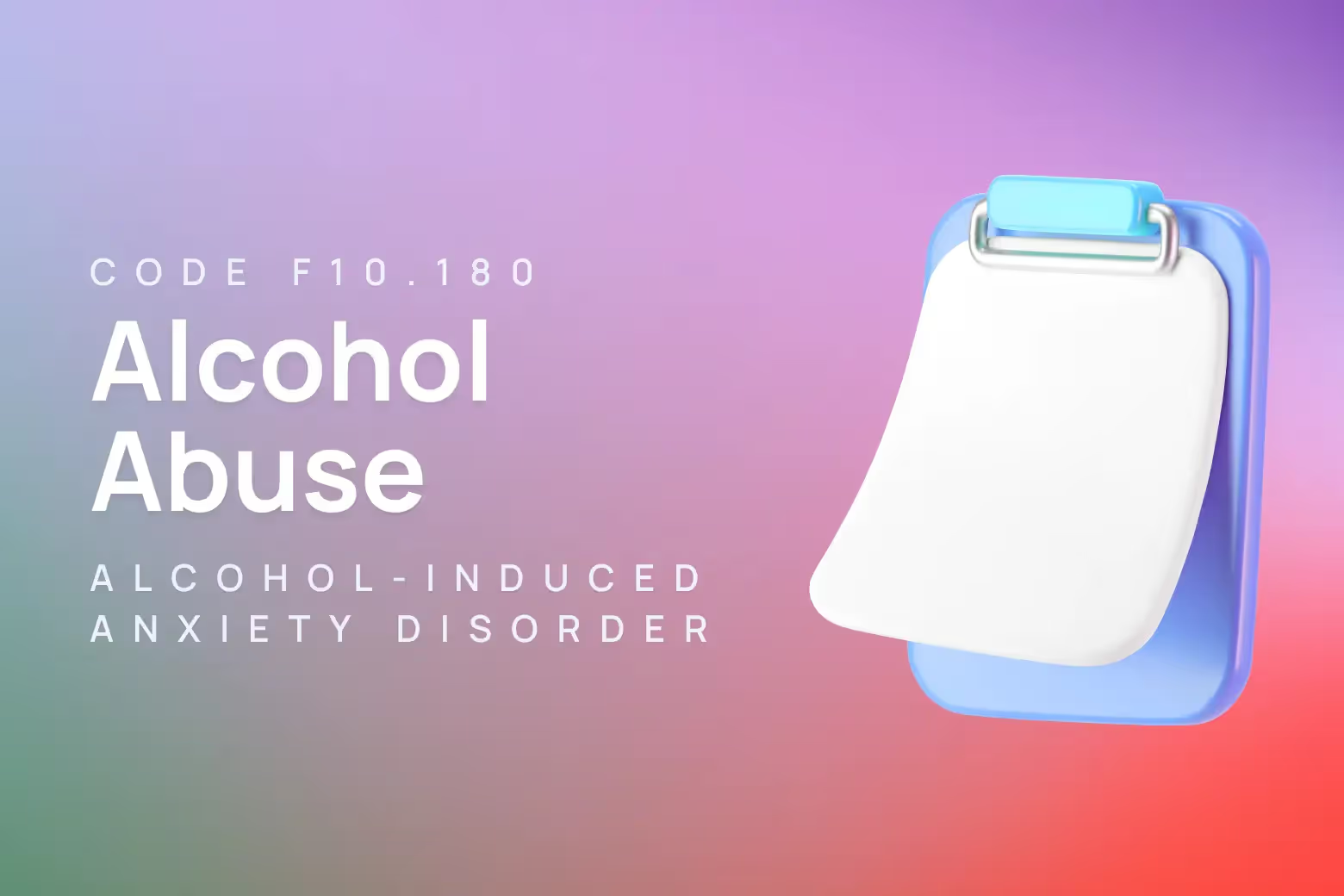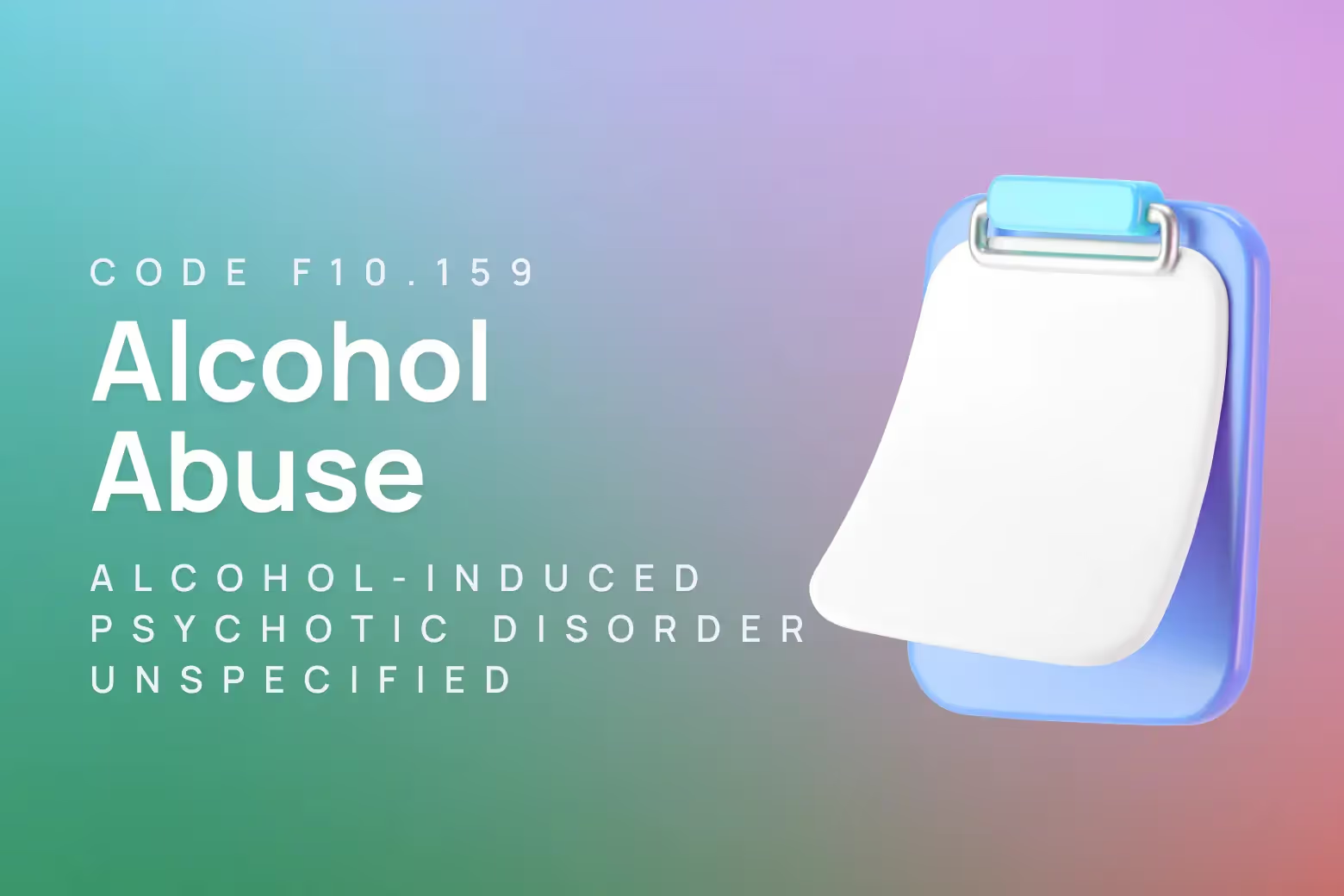ICD-10 code for alcohol use, unspecified, with alcohol-induced mood disorder

F10.94 is the ICD-10 code for alcohol use, unspecified, with alcohol-induced mood disorder.
This code represents a condition where alcohol use directly causes significant mood disturbances without meeting full criteria for a specific alcohol use disorder severity level.
Proper identification of alcohol-induced mood disorders prevents misdiagnosis and guides targeted treatment planning.
Key features:
- Used when alcohol directly causes mood symptoms like depression or mania
- Fourth character "4" indicates unspecified severity of underlying alcohol use disorder
- Distinguishes substance-induced mood changes from independent psychiatric conditions
- Requires temporal relationship between alcohol use and mood symptoms

Diagnostic criteria for alcohol use, unspecified, with alcohol-induced mood disorder (F10.94)
The F10.94 diagnosis requires clinicians to establish both the presence of alcohol use and the direct causal relationship between alcohol consumption and mood disturbances.
This code becomes appropriate when alcohol use patterns don't clearly fit mild, moderate, or severe categories but have triggered significant mood symptoms.
Alcohol-induced mood disorders develop during or within one month of alcohol intoxication or withdrawal. The mood disturbance must be clinically significant and cause substantial distress or functional impairment in social, occupational, or other important life areas.
Key diagnostic requirements include:
- Prominent mood symptoms (depressive, manic, or mixed features) during alcohol use or withdrawal
- Temporal relationship demonstrating mood symptoms emerged during or shortly after alcohol exposure
- Symptoms exceed what would be expected from typical intoxication or withdrawal effects
- Significant functional impairment or distress results from the mood disturbance
- Evidence that alcohol use directly caused the mood symptoms rather than an independent mood disorder
The mood symptoms may present as persistent sadness, elevated mood, irritability, or mood swings that represent a notable change from the individual's baseline functioning.
These symptoms must be substantial enough to warrant clinical attention and cannot be better explained by an independent mood disorder that preceded alcohol use.
When to use F10.94 diagnosis code
F10.94 requires careful differential diagnosis to distinguish alcohol-induced mood changes from independent psychiatric conditions. The timing and pattern of mood symptoms relative to alcohol use becomes crucial for accurate coding.
F10.94 vs F31.4 (Bipolar disorder, current episode depressed, severe)
F31.4 represents an independent bipolar disorder with a current severe depressive episode, while F10.94 indicates alcohol directly caused the mood symptoms. F31.4 requires a history of manic episodes and follows the natural course of bipolar disorder regardless of substance use.
The key distinction lies in temporal relationships and symptom persistence. F31.4 mood episodes often occur independently of substance use and follow bipolar disorder's characteristic patterns.
F10.94 mood symptoms emerge specifically during or after alcohol exposure and typically improve as alcohol use decreases.
F10.94 vs F10.10 (Mild alcohol use disorder)
F10.10 indicates mild alcohol use disorder with 2-3 symptoms present but no alcohol-induced mental disorders. When mood symptoms emerge from alcohol use, F10.94 takes precedence over standard alcohol use disorder codes.
The coding hierarchy prioritizes alcohol-induced disorders over standalone alcohol use disorders.
If both alcohol use problems and alcohol-induced mood symptoms are present, only F10.94 should be assigned as it captures both the alcohol use pattern and the resulting mood disturbance.
F10.94 vs F32.9 (Major depressive disorder, unspecified)
F32.9 represents independent major depression without substance-related causation. F10.94 specifically indicates that alcohol use directly triggered the depressive symptoms rather than occurring alongside an independent mood disorder.
Clinical assessment must determine whether depressive symptoms preceded alcohol use or emerged as a direct result of alcohol consumption.
Independent depression may persist during periods of sobriety, while alcohol-induced depression typically improves as alcohol use decreases and neurochemical balance restores.
Related ICD-10 codes
Understanding related F10 codes helps clinicians select the most appropriate diagnosis based on specific clinical presentations:
- F10.10 - Alcohol use disorder, mild (2-3 symptoms)
- F10.20 - Alcohol use disorder, moderate or severe (4+ symptoms)
- F10.129 - Alcohol intoxication with mild alcohol use disorder
- F10.229 - Alcohol intoxication with moderate/severe alcohol use disorder
- F10.239 - Alcohol withdrawal with moderate/severe alcohol use disorder
- F10.921 - Alcohol use, unspecified, with intoxication delirium
- F10.951 - Alcohol use, unspecified, with alcohol-induced psychotic disorder
Interventions and CPT codes for alcohol use, unspecified, with alcohol-induced mood disorder
Treatment for F10.94 typically involves addressing both the underlying alcohol use patterns and the resulting mood symptoms through integrated care approaches.
Psychotherapy interventions
Individual psychotherapy forms the foundation of treatment, helping clients understand the relationship between alcohol use and mood symptoms.
Cognitive-behavioral therapy (CBT) helps identify triggers, develop coping strategies, and modify thought patterns that contribute to both alcohol use and mood difficulties.
Motivational interviewing proves particularly effective for building readiness to change drinking behaviors that precipitate mood symptoms. This client-centered approach helps resolve ambivalence about reducing alcohol use and increases commitment to treatment goals.
CPT 90791 - Psychiatric diagnostic evaluation for comprehensive intake assessment and treatment planning.
CPT 90834 - Individual psychotherapy (45 minutes) for ongoing treatment sessions.
CPT 90837 - Extended individual psychotherapy (60 minutes) for complex cases requiring intensive intervention.
Screening and brief intervention
Structured screening identifies the severity of alcohol-related problems and associated mood symptoms. Brief intervention provides immediate feedback and motivational counseling to reduce harmful drinking patterns.
CPT 99408 - Alcohol screening and brief intervention (15-30 minutes) for commercial insurance.
CPT G0396 - Medicare alcohol screening and brief intervention (15-30 minutes).
CPT H0049 - Alcohol screening when required by Medicaid programs.
Group and family therapy
Group therapy provides peer support and shared learning experiences for individuals with similar alcohol-induced mood difficulties. Family therapy addresses relationship dynamics and builds support systems for sustained recovery.
CPT 90853 - Group psychotherapy for peer support and skills development.
CPT 90847 - Family psychotherapy with patient present to improve family dynamics and communication patterns.
How Upheal improves F10.94 ICD-10 documentation
Upheal's clinical documentation platform supports accurate F10.94 coding through several key features that help clinicians capture the complex relationship between alcohol use and mood symptoms.
Suggesting appropriate ICD-10 codes based on session content
The platform analyzes session notes to identify patterns indicating alcohol-induced mood disorders. When clients discuss mood changes occurring during or after drinking episodes, Upheal highlights the potential relevance of F10.94 coding.
This intelligent code suggestion helps clinicians recognize when mood symptoms may be substance-induced rather than representing independent psychiatric conditions.
The platform's analysis of temporal relationships between alcohol use and mood changes supports more accurate diagnostic coding.
Maintaining HIPAA-compliant records with proper diagnostic coding
Upheal ensures all F10.94 documentation meets healthcare privacy standards while capturing essential diagnostic information.
The platform's secure infrastructure protects sensitive information about substance use and mental health symptoms.
Comprehensive documentation includes the temporal relationship between alcohol use and mood symptoms, functional impairment details, and treatment response patterns. This thorough record-keeping supports insurance authorization and continuity of care.
Reducing administrative burden so you can focus on client care
Automated documentation processes free clinicians to concentrate on therapeutic interventions rather than extensive note-taking. Upheal streamlines the capture of complex diagnostic information required for F10.94 coding.
The platform's intelligent suggestions reduce time spent determining appropriate codes while improving documentation accuracy. This efficiency allows more time for direct client care and therapeutic relationship building.
Supporting clients with alcohol use, unspecified, with alcohol-induced mood disorder
Treating F10.94 requires integrated attention to both substance use patterns and mood symptoms. Clients benefit from understanding how alcohol directly affects their emotional well-being and developing alternative coping strategies.
Recovery typically involves gradual reduction of alcohol use while monitoring mood symptom improvement.
Many clients experience significant mood stabilization as their alcohol consumption decreases and brain chemistry rebalances. Building awareness of this connection motivates continued sobriety efforts.
Therapeutic support focuses on developing healthy emotional regulation skills that don't rely on alcohol use. Clients learn to identify early warning signs of mood changes and implement coping strategies before symptoms escalate.
Upheal's clinical documentation platform helps behavioral healthcare providers deliver more effective treatment by capturing the nuanced relationship between alcohol use and mood symptoms.
The platform's intelligent code suggestions and comprehensive documentation support accurate F10.94 diagnosis while reducing administrative burden.
Try Upheal for free to improve your alcohol-related mood disorder documentation and spend more time supporting your clients' recovery journey.













